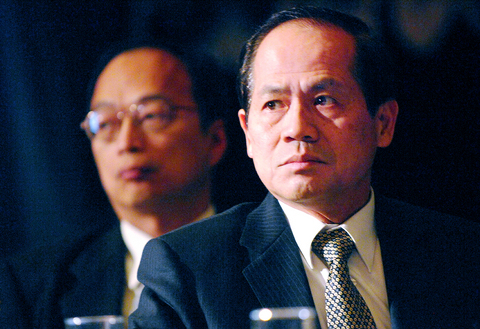Chi Mei Optoelectronics Corp (奇美電子), the nation's second-largest maker of flat panels for computers and TVs, posted its first quarterly earnings in the past three quarters as a price decline slowed on falling inventory.
Chi Mei expects inventory to shrink to a healthy level in the first quarter due to reduced output, which may trigger an early price hike for liquid-crystal-display (LCD) computer panels in the middle of next quarter.
"The business will hit the bottom in the second quarter and start to pick up in the third quarter ? The downturn will be more moderate this time," Chi Mei president Ho Jau-yang (

PHOTO: AFP
"We will not rule out the possibility of a shortage [of panels] in the fourth quarter," Ho said.
QUARTERLY RESULTS
During the fourth quarter of last year, Chi Mei eked out NT$436 million (US$13.22 million), or NT$0.05 per share, ending two straight quarterly losses since the second quarter last year, according to a company statement.
This represented a 95 percent decline from NT$8.34 billion, or NT$1.71 a share, a year earlier.
Drastic price correction has driven bigger rival LG Philips LCD Co, based in Seoul, into its third quarterly loss in a row last quarter at US$187 million in losses.
Average selling price (ASP) plunged 23 percent year on year to US$169 per unit in the final quarter of last year, but rose by 8 percent on quarterly basis, Chi Mei said.
Chi Mei expects blended ASP to drop by 3 percent to 5 percent at a quarterly rate in the first three months on seasonal factors, Ho said.
Panel shipments would fall 15 percent quarter-on-quarter, he said.
ANALYST REACTION
"Chi Mei's gross margin largely matches my expectation, but the increase in operating expense surprises me," said Frank Su (
Gross margin decreased to 10.9 percent last quarter from 24.6 percent a year ago, or a rebound from 4.6 percent last quarter.
Operating expenses, however, jumped 54 percent to NT$4.74 billion from the third quarter.
The one-time spike in operating expense would not be an obstacle on Chi Mei's progress toward a recovery in the second quarter, earlier than the company's forecast in the third quarter, said Su, who gave a "buy" on Chi Mei.
Overall, Ho said "it will be a challenging period this year and yet a high-growth year for Chi Mei."
2007 FORECAST
TV panel shipments should grow 45 percent annually to 13.3 million units this year on fast-growing demand for LCD TVs with bigger screens, Ho said.
Computer panels should increase 30 percent year-on-year to 30 million units, he said.
Chi Mei slightly cut its capital spending for this year to NT$75 billion compared to its earlier estimate of NT$80 billion and the NT$110 billion spent last year.

With an approval rating of just two percent, Peruvian President Dina Boluarte might be the world’s most unpopular leader, according to pollsters. Protests greeted her rise to power 29 months ago, and have marked her entire term — joined by assorted scandals, investigations, controversies and a surge in gang violence. The 63-year-old is the target of a dozen probes, including for her alleged failure to declare gifts of luxury jewels and watches, a scandal inevitably dubbed “Rolexgate.” She is also under the microscope for a two-week undeclared absence for nose surgery — which she insists was medical, not cosmetic — and is

CAUTIOUS RECOVERY: While the manufacturing sector returned to growth amid the US-China trade truce, firms remain wary as uncertainty clouds the outlook, the CIER said The local manufacturing sector returned to expansion last month, as the official purchasing managers’ index (PMI) rose 2.1 points to 51.0, driven by a temporary easing in US-China trade tensions, the Chung-Hua Institution for Economic Research (CIER, 中華經濟研究院) said yesterday. The PMI gauges the health of the manufacturing industry, with readings above 50 indicating expansion and those below 50 signaling contraction. “Firms are not as pessimistic as they were in April, but they remain far from optimistic,” CIER president Lien Hsien-ming (連賢明) said at a news conference. The full impact of US tariff decisions is unlikely to become clear until later this month

GROWING CONCERN: Some senior Trump administration officials opposed the UAE expansion over fears that another TSMC project could jeopardize its US investment Taiwan Semiconductor Manufacturing Co (TSMC, 台積電) is evaluating building an advanced production facility in the United Arab Emirates (UAE) and has discussed the possibility with officials in US President Donald Trump’s administration, people familiar with the matter said, in a potentially major bet on the Middle East that would only come to fruition with Washington’s approval. The company has had multiple meetings in the past few months with US Special Envoy to the Middle East Steve Witkoff and officials from MGX, an influential investment vehicle overseen by the UAE president’s brother, the people said. The conversations are a continuation of talks that

CHIP DUTIES: TSMC said it voiced its concerns to Washington about tariffs, telling the US commerce department that it wants ‘fair treatment’ to protect its competitiveness Taiwan Semiconductor Manufacturing Co (TSMC, 台積電) yesterday reiterated robust business prospects for this year as strong artificial intelligence (AI) chip demand from Nvidia Corp and other customers would absorb the impacts of US tariffs. “The impact of tariffs would be indirect, as the custom tax is the importers’ responsibility, not the exporters,” TSMC chairman and chief executive officer C.C. Wei (魏哲家) said at the chipmaker’s annual shareholders’ meeting in Hsinchu City. TSMC’s business could be affected if people become reluctant to buy electronics due to inflated prices, Wei said. In addition, the chipmaker has voiced its concern to the US Department of Commerce